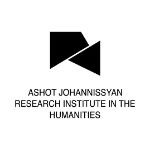 The Ashot Johannissyan Research Institute in the Humanities was founded in 2014 in Yerevan. The Institute aims to develop a theoretically and methodologically informed research sensitive to the possibilities of study offered by the object itself. The Institute encourages theoretical and philosophical research, development of new methodologies, as well as studies not confined to the framework of Armenian Studies. Yet the Institute formulates its objectives taking both the Armenian historical experience and Armenia as a position that provides a particular perspective onto the world, a perspective where various conflicting trends and legacies intersect. The historical scope of research is not limited to a particular period, though a priority is given to the studies of Modernity and the Modern period. The Institute is named after intellectual historian Ashot Johannissyan (1887-1972).
The Ashot Johannissyan Research Institute in the Humanities was founded in 2014 in Yerevan. The Institute aims to develop a theoretically and methodologically informed research sensitive to the possibilities of study offered by the object itself. The Institute encourages theoretical and philosophical research, development of new methodologies, as well as studies not confined to the framework of Armenian Studies. Yet the Institute formulates its objectives taking both the Armenian historical experience and Armenia as a position that provides a particular perspective onto the world, a perspective where various conflicting trends and legacies intersect. The historical scope of research is not limited to a particular period, though a priority is given to the studies of Modernity and the Modern period. The Institute is named after intellectual historian Ashot Johannissyan (1887-1972).
The goal of the Institute is to foster the humanities scholarship in Armenia and contribute critically to the ongoing international discussions in the field. The Institute aims to foster scholarly collaboration between Armenia and the Diaspora via research projects, publishing initiatives and translations. It aims to encourage historically conscious and theoretically engaged scholarship that would contribute critically and productively to the development of new approaches in the humanities through publishing, translation, public initiatives, library and archive. The Institute offers local scholars academic resources for their research and provides them with opportunities for sharing their research through publications, conferences, symposia and other forms of engagement with the public.
AREA / SUBJECT OF THE FELLOWSHIP
The fellowship activities can be on the following areas, Modern and Contemporary Art Theory, Art History, Literary Theory, Literature History, Philosophy, Political Philosophy, Intellectual History, History, Armenian Studies.
DESCRIPTION OF THE PROPOSED FELLOWSHİP ACTIVITY
The fellowship provides, academic advising and resources for the invited fellow. The Johanissyan Institute’s unique archive and the library that specialize in but are not confined to Armenian art, history, philosophy and literature with a special emphasis on the modern and contemporary periods will be at the disposal of the fellow. The library also houses a rich international literature on art history and theory, literary studies and philosophy, as well as rare out of print books and journals. The fellow will be provided with a working desk. The Institute’s research staff (Drs. Vardan Azatyan, Siranush Dvoyan and Angela Harutyunyan) and other research fellows will be available for consultation on the invited fellow’s research project, according to their areas of expertise (the biographies of the researchers can be found on our website at johannissyan.am). The fellow is expected to deliver a public talk on his or her ongoing research project. The Institute will facilitate the event and target the relevant audiences. In addition, throughout the duration of his or her stay the fellow is encouraged to organize a methodological workshop with the research staff of the institute, according to the area of his or her expertise. These workshops can be but are not confined to bibliography, method of research, working with archives and other approaches relevant for the fellow’s research and the needs of the institute’s researchers.
EXPECTED PROFILE
The fellow is expected to be a junior or mid-career researcher in the Humanities (with the minimum requirement of working towards an MA degree) whose work is relevant for the mission and research profile of the institute. We especially focus on topics and subjects dealing with Armenia in modern and contemporary periods. However, we have expertise beyond Armenian studies which includes philosophy, political theory, critical theory, art and literature history and theory. The fellow should be a person adaptable to an environment where collaboration and collective work, debate and discussion are welcomed and encouraged.
CONDITIONS OF THE FELLOWSHIP OPPORTUNITY
The use of the office space, the library and the archive is flexible, and at the discretion of the fellow. The working hours at the institute are 11am-6pm. Beyond these hours the fellow will need a special permission for using the premises and must take full accountability for the security of the space. When requested, the fellow should be available to participate in the meetings of the members of the Institute, and attend the relevant public events if these help to advance his or her research.
PROPOSED TIME FOR THE FELLOWSHIP
Any one month between April 2020 and May 2021 can be agreed upın the fellow and the host.
